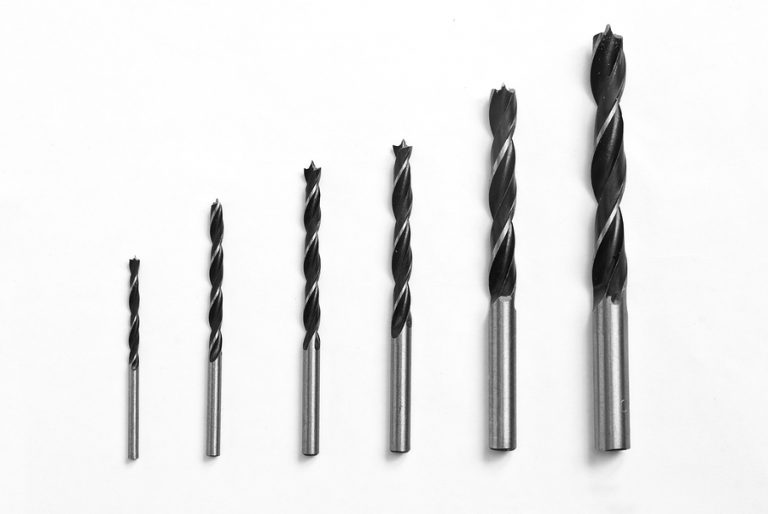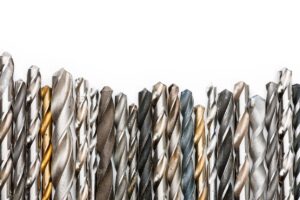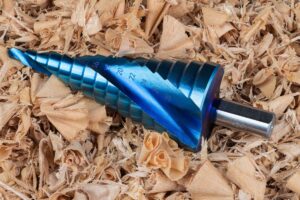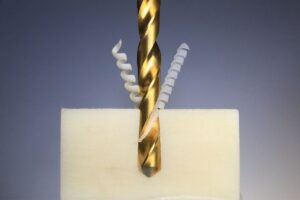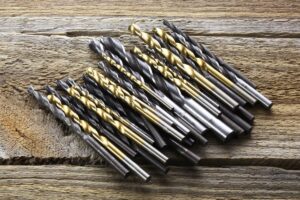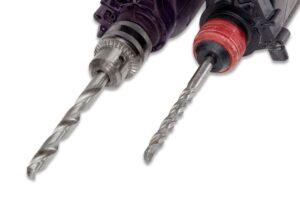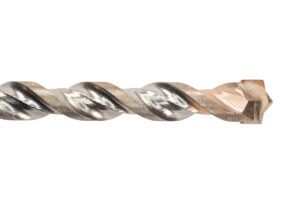Not all drill bits are alike. While most drill bits that you may find at your local hardware store are created from quality materials, they will vary depending on their application. In other words, the hardest, most durable metal is not always used for a variety of reasons. Understanding why drill bits are made from different metals will help you find the strongest one for the job you need to accomplish.
What follows are the reasons why drill bits are crafted from different materials and which ones are the strongest on the market today.
How the drill bit is going to be used plays a strong role in the type of metal that is used to create it. For example, a drill bit that is primarily designed to be used on wood is going to be different compared to one designed for drilling through metal. The application will dictate the type of metal used. Plus, there are other factors such as cost, durability, and strength that play a role as well.
Table of Contents
Metals Used for Drill Bits
Although there are several different types of metal that are used to create drill bits, five stand out as the most popular.
Steel
The most common metal used is steel, a metal that goes back over 3,000 years to the beginning of the Iron Age. For drill bits, there are three variations of steel that is used to make them.
- Soft, Low-Carbon
- High-Carbon
- High-Speed
Drill bits made from soft, low-carbon steel are fairly cheap. But they tend to lose their edge quickly even when used on softwoods. You can only use soft, low-carbon steel on softwoods as hardwoods tend to dull them quickly.
High-carbon variations are certainly more durable and well suited for softwoods, hardwoods, and some metal materials. Although they will hold their edge longer, if they overheat these drill bits can lose some sharpness which results in edges that are soft.
Created from tool-steel, high-speed steel improves on the heat-resistance. they can be used on hardwoods, metals, and many other types of material. With manufacturing of high-speed steel becoming far more abundant and less expensive, they have basically replaced the low-carbon and high-carbon versions.
Cobalt Alloy
Adding cobalt to the high-speed steel, this alloy is generally harder and can reach higher temperatures without dulling the edge. The alloy is commonly used to drill through most materials, including stainless steel. However, the downside is that they tend to be more brittle and subject to breaking under certain conditions.
Tungsten Carbide
A material that has become quite popular in recent years, including wedding rings. For drill bits, the tungsten carbide is the hardest available for consumers. It will hold its edge longer than the aforementioned metals. However, it is even more brittle than cobalt alloy, so the tungsten carbide is generally used on the tip of steel drill bits instead.
Hardest Drill Bit Coatings
Most common drill bits today are coated not only to protect the steel or metal that makes up the drill bit, but also to allow for easier drilling, protection against heat, and to resist oxidation that leads to rusting. There are two types of coating that are more commonly used that most others. Each has their own advantages when being used to coat drill bits
Black Oxide
This is a basic coating material that is inexpensive and designed to provide lubrication, heat resistance, and delay oxidation to the metal. It does not provide any additional strength or hardness, but it does help extend the life of certain types of drill bits such as high-speed steel.
Titanium Nitride
This combination is actually a ceramic material that covers twist drill bits, a common type of bit. Its primary purpose is to provide a harder tip for drill bits so they can keep their edge for longer periods. With the proper care, a drill bit coated with titanium nitride will last up to three times longer than bits covered by other materials.
Diamond Tips
Diamond tip coatings are another category of drill bit enhancement worth mentioning. Diamond, being the hardest known natural material, offers an unmatched level of drill bit hardness and wear resistance. Diamond-coated drill bits are especially advantageous for drilling into very hard materials like ceramic or porcelain tile, glass, or even some metals. The diamond coating significantly reduces wear and tear, extending the life of the drill bit significantly compared to its uncoated counterparts. In addition, the diamond coating allows the drill bit to maintain its edge and sharpness longer, increasing the lifespan and efficiency. The use of diamond tip coatings is particularly popular in industries that require precision and long-lasting drill bits, such as manufacturing, construction, and mining. However, as with all things, quality comes at a price, and diamond-coated bits are generally more expensive than those coated with other materials. But for particularly hard materials, diamond tip coated drill bits may well be needed to get the job done.
It is true that most coatings cover high-speed steel which is a common material. Keep in mind that other metals are used as well to create drill bits, although they are less common. What follows are the strongest drill bits available to consumers on the market.
Strongest Drill Bits For Steel & Other Materials
If you’re looking for the strongest drill bits, here are a few of our suggestions:
DeWalt DW1354 Titanium Drill Bit Set
Titanium is more expensive compared to steel and many other metals, but it should be noted that it coats the drill bit, it is not the primarily material. Because of the coating, the drill bits can go through hardwoods and most metals with ease while not losing their edge. One advantage is that the titanium tips the drill bit and is sharp enough to start on contact rather than having to prepare the area first. This also means that there is less “walking” when using this drill bit.
Irwin Cobalt M-35 Drill Bit Set
The cobalt-steel alloy provides for a durable combination that means cutting edges that stay sharp for a long time. Keep in mind that cobalt alloy is more brittle compared to high-carbon steel, but if used correctly they can punch through most materials easily with less chance of chipping or breaking.
VonHous Titanium-Coated Drill Bit Set
Another set of titanium-coated drill bits, this large 100-piece set is broken down into different applications. Some bits are designed for wood while others can drill through masonry and metal. The materials are tough, durable, and like most titanium-coated drill bits are more expensive compared to their softer steel counterparts.
Drilax Diamond Drill Bit Set
Made from steel with nickel coating, the Drilax diamond tipped drill bits are perfect whe you need the hardest drill bits for excellent results drilling granite, ceramic and porcelain tiles, glass, marble and other masonry. This is not for you if you need to drill plastic, steel or soft wood, which will clog up the drill bits.
Conclusion
While there are other drill bit sets on the market today, these three represent some of the best. For those who are looking for a singular drill bit that is the strongest, then those which are coated with titanium nitride is a good place to start. In addition, drill bits that are tipped with tungsten carbide are also some of the hardest, strongest materials used for drilling, although they do tend to be brittle. Care must be taken when selecting such hardened drill bits because they can chip, splinter, or break more easily compared to softer materials.
Founder of HandymanGuides.com and self-proclaimed “Mr. Fix-It”, Mike has countless years of experience building and tinkering with everything under the sun. He works as a local repair guy near Santa Monica, CA and when he’s not spackling drywall, he enjoys spending time with his wife and 2 daughters.

